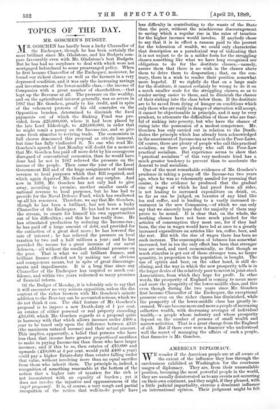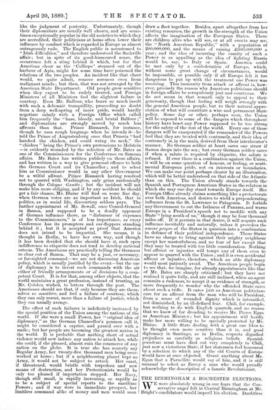AMERICAN DIPLOMACY.
WE wonder if the American people are at all aware of the extent of the influence they lose through the carelessness exhibited at Washington for the courteous usages of diplomacy. They are, from their unassailable position, becoming the most powerful people in the world, they are usually disinterested as to any events not occurring on their own continent, and they might, if they pleased, with a little judicial impartiality, exercise a dominant influence on international opinion. Their judgment might be felt like the judgment of posterity. Unfortunately, though their diplomatists are usually well chosen, and are some- times exceptionally popular in the old societies to which they are accredited, their politicians at home often lower their influence by conduct which is regarded in Europe as almost outrageously rude. The English public is accustomed to "Irish difficulties," and therefore understood the Sackville affair ; but in spite of its good-humoured sense, the occurrence left a sting behind it which, but for that American cheer as the Calliope ' steamed out of the harbour of Apia, might for some time have poisoned the relations of the two peoples. An incident like that cheer would, we quite admit, remove soreness even from malignant minds ; but then, that was not arranged by the American State Department. Old people grow sensitive when they expect to be rudely treated, and Foreign Ministers of all Ministers feel the slightest failure in courtesy. Even Mr. Balfour, who bears so much insult with such a debonair tranquillity, proceeding no doubt from a deep well-spring of inner pride, would hardly negotiate calmly with a Foreign Office which called him frequently the "base, bloody, and brutal Balfour ;" and diplomatists are strongly moved by much less affronts than that. Prince Bismarck, for instance, though he uses rough language when he intends it—he told the Prince of Augustenburg once that Prussia "had. hatched the chicken, and could wring its neck," the " chicken " being the Prince's own pretensions to Holstein —is evidently wounded by the selection of Mr. Bates as one of the Commissioners for the Conference on Samoan affairs. Mr. Bates has written publicly on those affairs, and has written in a way to give personal offence to both the German Court and its Chancellor ; and to select him as Commissioner would in any other Government be a wilful affront. Prince Bismarck having resolved not to quarrel with Washington, only grins sardonically through the Cologne Gazette ; but the incident will not make him more obliging, and. if by any accident he should get a fair chance, Mr. Blaine will find on some fine day, when German votes are as important as Irish, that in politics, as in social life, discourtesy seldom pays. The further appointment of Mr. Sewall, once Consul-General in Samoa, and. supposed to be a deadly opponent of German influence there, as "disburser of expenses to the Commissioners," is of less importance, as every Conference has its prompters and ear-flappers standing behind it ; but it is accepted as proof that America does not intend to be impartial. She means, it is thought in Berlin, to have her own way, and though it has been decided that she should have it, such open indifference to etiquette does not tend to . develop national esteem. The Americans are practically telling the Germans to clear out of Samoa. That may be a just, or necessary, or far-sighted command—we are not discussing American policy, which is usually justified by the event—but the use of diplomacy is to invest such commands with the air either of friendly arrangements or of decisions by a com- petent Court. It is for that, among other objects, that the world maintains a great profession, instead of trusting, as Mr. Cobden wished, to letters through the post. The Americans should see that, if only because they are them- selves so sensitive, and feel a failure of courtesy, which they can only resent, more than a failure of justice, which they can usually avenge.
The effect of such failures is indefinitely increased by the special position of the Union among the nations of the world. If she were a, small Power, her "original idea of diplomacy," as the German Chancellor's penmen call it, might be considered a caprice, and passed over with a smile ; but her people are becoming the greatest nation in the world. It is probable that nothing short of actual violence would now induce any nation to attack her, while she could, if she pleased, almost ruin the commerce of any nation on the globe. It is true she has scarcely any Regular Army, her twenty-five thousand men being over- worked at home ; but if a neighbouring planet kept no Army, it would not be subject to attack. Her coast, if threatened, would bristle with torpedoes and new means of destruction, and her Protectionists would be only too pleased if importation stopped. Her Navy, though still small, is rapidly increasing, so rapidly as to be a subject of special reports to the maritime Powers ; and if war were in immediate prospect, her limitless command alike of money and men would soon draw a fleet together. Besides, apart altogether from her existing resources, the growth in the strength of the Union affects the imagination of the European States. There are children alive who will see, or at all events may see, the "North American Republic," with a population of 200,000,000, and the means of raising £300,000,000 a year ; and the idea of incurring the enmity of such a Power is as appalling as the idea of fighting Russia would be, say, to Italy or Spain. America could be met only by a confederation of Europe, which, without some great change of circumstances, would be impossible, or possible only if all Europe felt it too dangerous to put up with the treatment one Power was receiving. This immunity from attack or affront is, how- ever, precisely the reason why American politicians should in foreign affairs be scrupulously just and courteous. We do not mean in that remark only to appeal to their generosity, though that feeling will weigh strongly with the general American people, but to their natural appre- ciation of what will constitute a wise and permanent State policy. Some day or other, perhaps soon, the Union will be exposed to some of the dangers which throughout history have beset any Power supposed to be too strong for the safety of the rest of the world. Every one of those dangers will be exasperated if the remainder of the Powers feel that they are treated with contumely, and their idea of contumely is, in the main, derived from their interlocutor's manner. No German soldier at heart cares one straw if Samoa drops into the sea ; but every German soldier cares if when a salute is required by etiquette, the salute is refused. If ever there is a combination against the Union, it will be on some question of honour, or feeling, or senti- mental European pride, not on interests or boundaries. We can make our point perhaps clearer by an illustration, which will be better understood on that side of the Atlantic than on this. The Union already stands towards the Spanish and Portuguese American States in the relation in which she may one day stand towards Europe itself. Her Foreign Office already claims something like a protectorate over both Americas, and desires to wield. a preponderating influence from the St. Lawrence to Patagonia. It forbids any Government to cut the Isthmus of Panama, and warns ,Europe in a President's speech not to meddle with any State "lying south of us," though it may be four thousand miles off. If it persists in that desire, it will acquire such influence inevitably and naturally, unless it provokes the amour propre of the States in question into a combination in defence of their political independence. Those States have no charge to bring against their mighty neighbour except her masterfulness, and no fear of her except that they may be treated with too little consideration. Nothing but affront or injustice will tempt any of them even to appear to quarrel with the Union ; and it is even accidental affront or injustice, therefore, which an able diplomacy would most patiently avoid. The American people begin to see that, we imagine, for already appointments like that of Mr. Bates are sharply criticised ; but they have not realised it quite fully, and are still inclined, when an agent commits a rudeness, to accept it as evidence of strength, or more frequently to wonder why the offended State cares about such a trifle. It cares just as American politicians care for an affront from the man who will be President, from a sense of wounded dignity which is intensified, not diminished, by an ill-defined fear. Chili, for example, has nothing to do with English quarrels, and no reason that we know of for dreading to receive Mr. Pierce Egan as American Minister ; but his appointment will hardly make her more willing to be specially protected by Mr. Blaine. A little State dealing with a great one likes to be thought even more sensitive than it is, and good diplomacy in Santiago, as in Berlin, respects dignified prejudices as carefully as religious beliefs. Spanish grandezza must have died out very completely in Chili, just now a victorious State, if her statesmen feel honoured by a selection to which any of the old Courts of Europe would have at once objected. Grant anything about Mr. Egan that a Parriellite would say of him, and it is still unusual to select as Envoy a man who would proudly acknowledge the description of a fanatic Revolutionist.



































 Previous page
Previous page